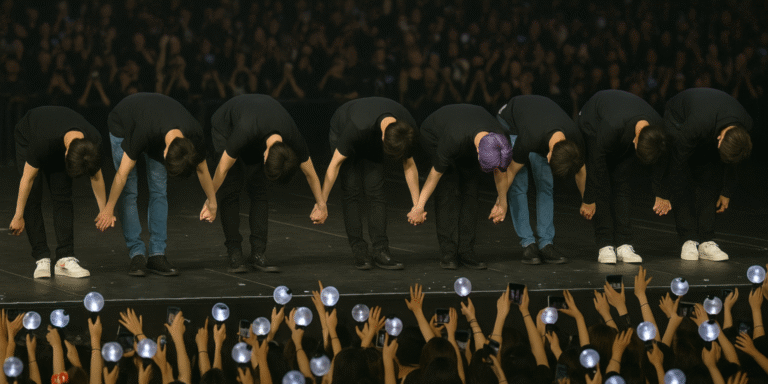In June 2022, the world’s biggest K-pop group, BTS, made a landmark announcement that shocked fans and the global music industry alike—after nearly a decade of chart-topping success, the group would be taking a break to pursue individual solo projects. This news marked a significant moment in the evolution of K-pop, signaling a shift away from the genre’s traditionally tight-knit group dynamics and emphasizing the growing importance of individual artistic freedom and self-expression.
For many fans, this decision came as a bittersweet reminder that even the most successful boy band in history has to evolve. The announcement not only reshaped the future of BTS but also offered a broader reflection on the current state of K-pop and its changing trajectory in the global music landscape.
The Announcement and Its Impact on Fans
BTS’s decision to go on hiatus was made public during a live-streamed dinner celebration for the group’s ninth anniversary, where the members gathered to reflect on their journey and what the future held. In their candid discussion, the seven members—RM, Jin, Suga, J-Hope, Jimin, V, and Jungkook—spoke openly about the pressures of being in a group and how each member yearned for personal growth.
“We all needed to take a break, reflect, and come back better,” said leader RM, in an emotional yet determined tone. “The time has come for us to take the next step forward in our careers as individuals.”
While many fans were initially devastated by the news, they quickly rallied behind the group’s decision, understanding that their favorite artists were not breaking up, but simply taking time to explore new creative horizons. This collective support underscored a shifting perspective in K-pop fandoms: the importance of artistic autonomy and personal fulfillment, over a rigid commitment to group identity.
K-Pop’s Shift: From Group Harmony to Artist Autonomy
BTS’s hiatus was more than just a break from performing as a group; it was a pivotal moment in K-pop’s history, one that highlighted the genre’s changing relationship with both its idols and the international audience.
K-pop has long been known for its emphasis on perfect teamwork, where members often appear to function as interchangeable pieces in a larger machine. The industry’s practice of tight schedules, synchronized group promotions, and uniform image crafting often left little room for individual artists to explore personal creative avenues. However, BTS’s decision was a reflection of a more globalized, individualized music scene that has become increasingly prevalent in the entertainment industry as a whole.
The rise of solo artists within the genre, both inside and outside of K-pop, speaks to this shift. As seen with other groups like EXO, Twice, and Red Velvet, members are now often encouraged to take solo projects, participate in acting, or even collaborate with international artists. This has become part of a broader cultural shift where artists are more empowered to express themselves outside of group constraints. BTS’s hiatus echoed this trend, as each member began to focus on personal endeavors—J-Hope, for example, released his album Jack in the Box, while Jin pursued his solo debut with The Astronaut in late 2022.
The Global Pop Phenomenon: A New Era of International Music
K-pop’s success has always been tightly linked to its ability to blend cultural boundaries and its tight-knit group dynamics. But BTS’s hiatus represents a turning point in the international music industry, where artists can now transition seamlessly between group and solo identities, without sacrificing the global presence or fanbase they’ve worked so hard to build.
With BTS’s monumental success on the international stage—securing Grammy nominations, Billboard records, and massive tours—it’s clear that K-pop’s appeal has surpassed its original geographic boundaries. As K-pop enters this next era, the genre will likely see more artists pursuing solo ventures, collaborations with artists across the world, and an increased focus on the individuality that has long been celebrated in Western music but was previously subdued in the K-pop system.
This move also reaffirms BTS’s role as leaders in the K-pop industry, as they continue to evolve while maintaining a strong bond with their fans. As RM stated in their live broadcast, “We will always come back together. We are one.”
What Does This Mean for BTS Fans?
While the hiatus might have initially left fans uncertain of what the future holds, it opened new doors for both the group and their supporters. Fans were no longer tied to the idea of BTS as a constant presence but were instead given the chance to experience each member’s personal artistry in a more intimate, individualized way.
The BTS hiatus, while temporary, provided fans with an opportunity to witness their idols’ growth and evolution. Moreover, it allowed the members to reconnect with themselves outside the pressure of group dynamics, resulting in fresh music, creative projects, and a deeper connection with fans. This change helped elevate BTS not just as a group, but as a collective of influential solo artists capable of influencing the future of pop music.
Looking Ahead: A Bright Future for K-Pop’s Next Chapter
As of now, BTS continues to be one of the most influential musical acts worldwide, with the members individually contributing to music, film, and even social issues. In 2023, BTS’s Jin completed his mandatory military service, and other members have followed suit with solo projects. Their return to the stage as a complete group may be delayed, but BTS has clearly proven that there’s more to their story than their time as a group.
With this pause allowing room for growth, both BTS and K-pop as a whole are primed to take on an even greater role in global pop culture. As the genre becomes increasingly diversified, fans can expect to see K-pop evolve into a platform where artists express their individualism, making room for new sounds and global collaborations.


